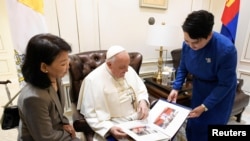Pope Francis capped the final day of his diplomatically tinged visit to Mongolia preaching charity, with a visit to a Catholic shelter for the homeless and domestic violence victims.
The visit to inaugurate "The House of Mercy," which also includes a clinic, in a poor area on the outskirts of the capital Ulaanbaatar suits the 86-year-old pope's longstanding practice of reaching out to marginalized, overlooked communities.
Francis' voyage to the Central Asian nation — the first by a pope — has been overshadowed by his overtures to its powerful neighbor China.
Some Chinese Catholics have traveled to Mongolia to catch a glimpse of Francis up close, and outside the shelter on Monday, a group of women sang in Mandarin, wiping away tears as the pope's black car passed.
"Dear Pope, our best wishes for you," they sang.
The pontiff directly addressed Catholics in China on Sunday in impromptu comments following a Mass, telling them to be "good Christians and good citizens," in an apparent attempt to ease tensions with Beijing.
Many traveling Chinese Catholics told authorities at home they were traveling to Mongolia for tourism, according to interviews with AFP.
After the Mass, attended by many of Mongolia's tiny Catholic population numbering just 1,400, Francis sent "a warm greeting to the noble Chinese people".
"To the people I wish the best," he said, flanked by the bishop and bishop emeritus of Hong Kong.
It was the second apparent overture to the Chinese Communist Party in two days, following Francis telling a gathering of missionaries Saturday that governments had "nothing to fear" from the Catholic Church.
The pope's plane took off shortly after midday, with his account on X -- formally called Twitter — hailing the Mongolian "friendship" he received over the four-day trip.
"Dear brothers and sisters of Mongolia, thank you for the gift of friendship that I received in these days. Bayarlalaa [Thank you in Mongolian]! May God bless you," the account posted.
"You are in my heart, and in my heart you will remain. Remember me, please, in your prayers and in your thoughts."
'Not against our country'
China's government, which is officially atheist, is wary of the Catholic Church on its territory, and exercises strict control over all recognized religious institutions.
A Chinese woman from the northwestern city of Xi'an who attended Mass Sunday described to AFP the difficulty of making the pilgrimage, saying two organizers of her tour had been detained back in China.
"Let me tell you, I feel so ashamed to hold the (Chinese) national flag," she said.
"But I need to hold it and let the pope know how difficult it is for us."
Another woman from the Chinese province of Hebei told AFP she felt "so blessed and happy to be able to be here and see the pope".
"To have our own religion doesn't mean that we are against our country," she added.
The Holy See has sought a rapprochement with China for years, and renewed a contentious 2018 deal last year that gives both parties — and not just the Church — a say in appointing bishops in China.
Critics have called the move a dangerous concession in exchange for a presence in the country.
A former Soviet satellite state that has been a democracy since 1992, Buddhist-majority Mongolia has one of the world's youngest and smallest Catholic communities, estimated at approximately 1,400 people among its population of 3.3 million.
It has just 25 Catholic priests — only two of them Mongolian — and 33 nuns.
Freedom of religion is guaranteed in its Constitution.
Mongolia has sought to toe a neutral line with its expansionist neighbors Russia and China, on whom it depends for imports of energy and the export of its coal, even as it reaches out to third countries, including the United States and South Korea, for balance.




